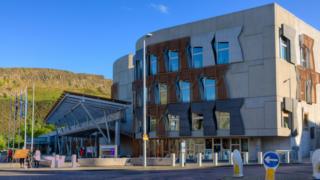 Image copyright
Getty Images
Image copyright
Getty Images
MSPs are set to formally refuse to give Holyrood's consent to the UK's main piece of Brexit legislation.
The Scottish and UK governments are at odds over the EU Withdrawal Bill and what it could mean for devolved powers.
Labour, Green and Lib Dem MSPs are expected to back SNP members in rejecting the Westminster bill, saying it would restrict Holyrood's powers.
The Scottish Conservatives will vote against, and have blamed the SNP for the failure to find an agreement.
UK and Scottish ministers have said the door is still open to finding a deal, although both sides have admitted they remain some distance apart.
The dispute centres on what will happen to devolved powers which are currently knitted into EU-wide frameworks of rules and regulations after the UK leaves the EU.
Both sides have agreed that some powers should go into UK-wide frameworks, but differ over how this should be done and who should have the final say over them in future.
Scottish ministers contend that the devolved parliaments should have to give express consent for changes to these frameworks, while the UK side contend that this would effectively give MSPs the power of veto over frameworks extending right across the country.
The Welsh government reached an agreement with UK ministers over devolved powers, and changes reflecting this deal have been written into the current draft of the Withdrawal Bill, set to have its third reading in the House of Lords on Wednesday.
However the Scottish government says there remains a key "point of principle" over consent, and has put forward a motion asking MSPs to formally refuse consent for the bill.
Only the Scottish Conservatives will oppose the motion, with Labour, the Greens and the Lib Dems all expected to back the SNP.
The Conservatives have put forward an amendment proposing the parliament consent to the bill, while Labour tabled one adding a call for "cross-party talks in an attempt to broker an agreed way forward".
'Absolute prerequisite'
Ms Sturgeon told BBC Scotland there was an "issue of principle" at the heart of the row which must be respected if any deal is to be done.
She said: "In the view of the Scottish government, and I think we're backed on this by other parties with the exception of the Conservatives, the consent of the Scottish Parliament to the removal of any of our powers should be an absolute prerequisite.
"We're still open to doing a deal if the UK government respects that principle.
"We've always said that post-Brexit there will be area where UK-wide frameworks will be required, but they should not imposed on Scotland in devolved areas, they should be introduced only with the consent of the Scottish Parliament."
Under the existing devolution settlement, Westminster ultimately has the power to legislate on devolved matters without consent - but it has never done so. Ms Sturgeon said such a move would take matters into "uncharted and unprecedented territory".
She said that if no deal can be done, UK ministers should "respect the decision of the Scottish parliament" rather than "ride roughshod" over it.
The Scottish government wants its own Brexit bill, which was passed by MSPs by a margin of 95 to 32, to fill in for the Withdrawal Bill in Scotland if no agreement can be reached. However, UK law officers have challenged that "continuity bill" in the Supreme Court.
'Profoundly regrettable'
Appearing before a series of Holyrood committees last week, Scottish Secretary David Mundell was pressed repeatedly on whether the UK government would push ahead without consent. He refused to answer, stating instead that he was focused on finding an agreement.
He told BBC Scotland he was "not pre-empting the vote" at Holyrood, saying he hoped individual MSPs would "take a step back" and conclude that the UK government's proposal was a "reasonable solution".
Scottish Conservative constitution spokesman Adam Tomkins said adequate changes had been made to the bill, highlighting backing from Labour in Wales and various Labour and Lib Dem peers.
He said: "It's profoundly regrettable that we don't have a deal in Scotland to allow us to move on. The blame for that lies entirely with the SNP. Nicola Sturgeon has refused to compromise. It's not in Scotland's interests that the SNP prefers picking fights to making a deal."
Scottish Labour's Brexit spokesman Neil Findlay blamed the Conservatives, taking aim at their "shambolic handling" of the affair.
He said: "The people of Scotland want this mess fixed and even at this late stage there is still time to do that."
Scottish Greens co-convener Patrick Harvie said MSPs "must continue to challenge the extremist Brexit obsessions of Ruth Davidson's Conservatives, and defend our European future".
Lib Dem Europe spokesman Tavish Scott said that "the Brexit process has been chaotic and the treatment of the devolved administrations has been shoddy".